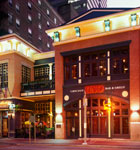At a Glance
Location
South Salt Lake City, UT
Founded
1971
Employees
98
Specialty
Development of affordable housing
When discussing the trials and tribulations associated with nonprofit work, Kerry Bate likes to joke that public service is about disappointing people at a rate they can absorb. This seems to be a humble way to deflect the important work that he’s doing as the executive director of the Housing Authority of the County of Salt Lake (HACSL). Bate became familiar with the HACSL during his 19 years working for the state, and when he took over in 2003, the organization began focusing on affordable housing for the chronically homeless, a move that would prove to have a major impact on the community.
The chronically homeless are characterized as those who’ve been homeless for a year or more with a disabling condition or those who’ve had three bouts of homelessness in one year. Keeping such individuals housed can be difficult because of the unique challenges they face, the biggest hurdle of which is filling out the paperwork necessary to be a tenant in the affordable housing the HACSL provides.
“Many of the homeless people we service have mental illnesses, and that can make filling out paperwork very challenging,” Bate says. “The key to our success has been offering supportive housing, which means there’s a supportive network in place that helps our tenants with paperwork, substance-abuse problems, behavioral issues, or any other issues that may arise.”
The HACSL’s Kelly Benson Apartments are experiencing a 90 percent success rate, and as of 2006, the rate of chronically homeless people in Salt Lake City has dropped by 70 percent. And, not only is housing a more humane approach to homelessness; it’s also a cost effective one. According to Bate, a chronically homeless person living on the streets costs $17,000 each year in psych-ward, jail, and hospital visits, but a person who’s housed costs between $6,800 and $7,200.
Despite already having a low rate of homelessness when compared with more urban states, Utah has taken a decidedly aggressive approach to the problem, forming a homeless trust fund and providing grants to those working to alleviate the problem. Utah is also the home of the State Homeless Coordinating Committee, which intends to completely eradicate chronic homelessness by 2014. These initiatives are a major contributing factor to the success rates experienced by nonprofits such as the HACSL, but Bate says a rather surprising additional source of success has been the actual layout of affordable housing complexes.
“We toured similar housing projects in Seattle and spoke to property managers who told us that the inclusion of social spaces is crucial to success,” Bate says. “If you think about it, it makes a lot of sense. On the streets there are a lot of people to socialize and interact with; it’s a constant hub of activity. Going from that to retiring to your apartment alone can be really depressing, especially for those with mental illnesses.”
Grace Mary Manor, a joint project by the HACSL and Housing Opportunities, Inc., is composed of small apartments, but the complex also features communal areas, including an exercise room, a conference center, a library, a basketball court, a horseshoe pit, and a community garden. Socializing is also built into tenants’ everyday tasks, such as getting the mail. The mailboxes are located by the front desk, encouraging residents checking their mail to talk with those coming in and out of the building. There’s also a laundry room located on the first floor, giving tenants the opportunity to chat while folding clothes.
Springboarding off its work for the chronically homeless, the HACSL is currently in the early stages of building the Bud Bailey Apartments, which will specifically be for refugees. Utah is home to thousands of refugees from Asia and Africa, and with this new project, Bate hopes to continue helping as many as he can. “So many people need so much help, and it’s impossible to address everyone’s needs,” he says. “That can be very frustrating, but I know we’re helping people, and that’s very gratifying. Would working at a for-profit be easier? Sure, but for me the social mission trumps any profit motive.” ABQ



